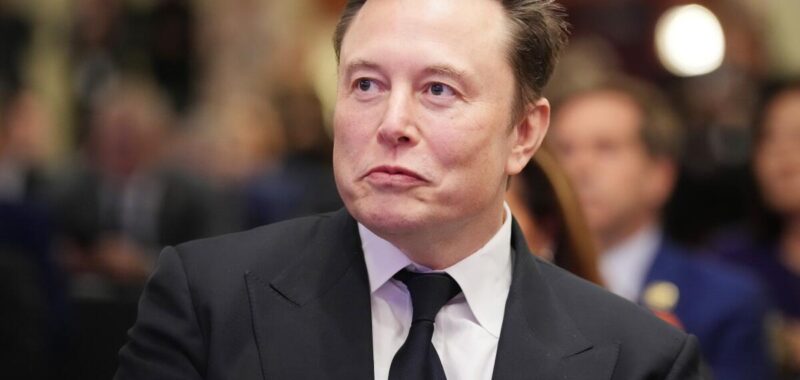Tesla is off to a bumpy start this year.
The electric vehicle giant’s profit plunged 71% in the first quarter to $409 million as the company faced a flurry of setbacks, including looming tariffs and a brand crisis perpetuated by Chief Executive Elon Musk’s prominent role in the Trump administration.
The Austin, Texas-based company reported adjusted earnings per share of 27 cents, well below analysts’ expectations of 41 cents.
Revenue during the period dropped 9% from a year earlier to $19.3 billion.
Although it remains the world’s dominant automaker, Tesla has seen its stock plunge nearly 40% this year amid a decline in automotive sales and increasing competition from other electric vehicle manufacturers.
Tesla’s share price, which rose 4.6% on Wednesday to close at $237.97, has been subject to turbulence for months.
Shares rose after President Trump purchased a Model S on the White House lawn in March, but fell significantly in early April as investors became increasingly worried about a backlash against the Tesla brand.
The treasurers of eight states wrote an open letter to Tesla’s board of directors last week, voicing concern that “Tesla’s recent performance signals deeper governance and leadership challenges.”
The treasurers questioned Musk’s role in the so-called Department of Government Efficiency, or DOGE, and cited dropping share prices and vehicle delivery numbers.
Wedbush Securities analyst Dan Ives previously slashed his price target for Tesla shares by more than 40% to $315 from $550.
Driving Tesla’s woes is Musk’s deteriorating reputation, Ives said, which has led to protests and boycotts against Tesla and incidents of vandalism on Tesla vehicles and chargers.
Musk leads DOGE, which has made controversial cost cuts under Trump.
“Tesla has become a political symbol around the world and that’s not a good thing,” Ives said in an interview. “Musk needs to recommit to Tesla and officially take a step back from DOGE to do damage control.”
Tesla drivers who were once drawn to the environmental benefits of electric vehicles are growing embarrassed by their cars’ association with Musk, The Times has reported. Several celebrities have gotten rid of their Teslas as part of a public stand against the company.
Meanwhile, the vehicles’ falling resale value suggests a drop in demand, said Iseecars.com analyst Karl Brauer. In February, Tesla topped the list of brands that lost the most resale value year over year.
Although Musk has found himself securely in Trump’s corner, the president’s actions on tariffs pose a significant challenge for Tesla, which now faces a 25% tax on auto imports.
This month, Tesla suspended imports of crucial auto parts from China after Trump announced a 145% tariff on Chinese goods. Tesla had relied on China for components used to build its Cybercab, Musk’s budding robotaxi effort that has yet to hit public roads.
Musk unveiled the Cybercab in October and said Tesla’s autonomous driving technology would be ready for use in the near future. He has been touting the capabilities of the company’s Full Self-Driving mode for years, though the feature cannot be used without a human driver behind the wheel.
The decision to halt imports from China could disrupt plans to mass produce the Cybercab, which are vital to investor confidence in the company. Tesla will also stop importing Chinese parts for its electric semi truck.
Tesla said it produced 362,615 vehicles in the first quarter and delivered 336,681 vehicles. Deliveries fell 13% from last year. The company’s newest vehicle, the Cybertruck, has seen a falloff in sales.
In a quarterly webcast, Musk sought to allay investor worries, saying he would spend less time in Washington.
He painted a bright future for Tesla, citing the potential of autonomous driving and predicting that Optimus, Tesla’s humanoid robot, would lower labor costs and increase productivity.
“Tesla will be the most valuable company in the world by far but there will be a few bumps in the road before that happens,” Musk said on the call.

